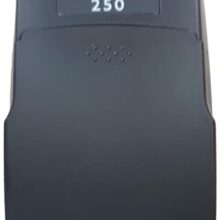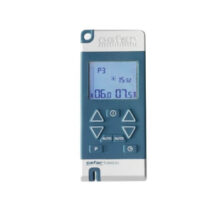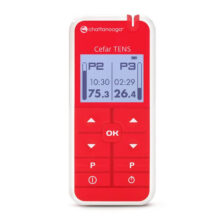Analog TENS Model 250
Login For Dealer Pricing
The Model 250 from BodyMed is an analog TENS unit that offers a 2 channel signal and proves 3 possible treatment modes. It is designed with user safety in mind.
Transcutaneous electrical nerve stimulation (or TENS) is a pain relief therapy that uses a small electrical current. These signals are directed to the pain sensing nerves just below the skin.
TENS should not be confused with electrical muscle stimulation (EMS). EMS is a form of therapy aimed at rehabilitating disused muscles (instead of nerves). Unlike TENS therapy, EMS is not generally used for pain management.
Although TENS treatment can be easily carried out at home, we suggest getting medical advice before doing this. It is important to ensure it is advisable for someone in your particular situation.
As with many forms of electrotherapy, TENS therapy is generally contraindicated for people wearing cardiac pacemakers. Other conditions may also make it an unsuitable or risky form of treatment. We will cover this subject in greater detail below.
In this article, we will attempt to answer some of the more common questions about transcutaneous electrical nerve stimulation. We hope that this will better equip you to decide (with your doctor) if this therapy is right for you.
TENS therapy is a non pharmaceutical, non addictive and side effect free way to relieve pain. It is used by patients suffering from a wide variety of chronically painful conditions such as low back pain and arthritis.
Another factor in the growing popularity of TENS machine use is the fact that they can be purchased without a prescription.
In addition, TENS machines are designed with controls to make them easy to use. Patients can easily use them at home to treat pain from arthritis, labor (pregnancy) and other conditions. Moreover, Individuals with restricted mobility do not have to worry about traveling to a doctor’s office for a consultation.
Social distancing has attained greater importance in Canada due to the advent of the COVIS-19 pandemic. As a result, the ability to obtain pain relief at home is a particularly important factor. Many individuals who suffer from chronic pain may also have comorbidities that place additional priority on social distancing.
You can approach a physiotherapist or acupuncturist for a course of TENS treatment. Other medical professionals may also be able to administer treatments.
You can also purchase a TENS device at a medical supply store if you have a prescription from a healthcare provider.
However, we would suggest that you check with your doctor as to whether you should use the device at home. Based on your condition, your doctor may advise you to use the machine only under his or her supervision.
TENS therapy is usually administered using a small device (or TENS unit) that is often similar in size to a smartphone. Leads are attached to this device at one end and a set of electrodes is attached to the other.
At the beginning of the treatment, you (or your physiotherapist) attach the electrodes directly to your skin. The attachment is near to the painful area that you intend to treat.
The TENS machine is then switched on. It will deliver low level electrical impulses that penetrate your skin. These signals are targeted to the nerves underneath your skin. While this is happening, you will usually experience a tingling feeling in the area being treated.
The aim of TENS treatment is to reduce pain signals sent by the nerves to the brain via the spinal cord. By doing so, the pain felt by the patient is attenuated, enabling him/her to relax and improving quality of life.
In addition to reducing the pain signals transmitted by your nerves, TENS therapy is believed by some to increase endorphin production. Endorphins are believed to increase your feeling of well being and allow you to relax. They may also act as a natural form of pain killer in the body.
TENS can be used to address a wide range of chronic pain conditions and the accompanying muscle spasms. These may include:
Currently, clinical trials are in progress to assess the effectiveness of TENS treatment.
One such study was conducted recently on the effectiveness of transcutaneous electrical nerve stimulation on fibromyalgia pain. The results were reported on the Pain Research Forum website.
The study used a randomized and blinded design with placebo controls. There were 301 female participants and they were randomly assigned to one of 3 groups:
Seventy percent of participants in the Active TENS group reported an improvement in their condition. This compared to 31% in the placebo TENS group and 9% in the no TENS group.
Although these results are encouraging, several other studies of the effectiveness of TENS treatments are still ongoing.
So far, there have been only a few reported side effects of TENS therapy. In a few cases, patients have reported burns at the points of attachment of the electrodes.
In addition, there have been some allergic reactions to the adhesives used to attach the electrodes to the patient’s skin.
Patients who are in the following groups should also avoid using TENS machines:
If you experience any unusual symptoms while using a TENS unit, discontinue treatment and consult a doctor.

Login For Dealer Pricing
The Model 250 from BodyMed is an analog TENS unit that offers a 2 channel signal and proves 3 possible treatment modes. It is designed with user safety in mind.

Login For Dealer Pricing
The Cefar Basic Tens machine from Chattanooga comes with three pre-installed programs and is designed to meet all the basic pain management needs by way of nerve stimulation.

Login For Dealer Pricing
The Cefar TENS kit offers independent channels and both TENS and NMES functionality to offer pain management and rehab functionality in a single unit.

Login For Dealer Pricing
The Cefar TENS machine offers independent channels and both TENS and NMES functionality to offer pain management and rehab functionality in a single unit.

Login For Dealer Pricing
The Direct Tens from Chattanooga is designed for ease of use by patients facing painful conditions like arthritis.

Login For Dealer Pricing
The Intelect TENS unit comes in three variations – basic, standard and digital – and can address multiple patient needs, from pain management to preventing or retarding the atrophy of disused muscles.

Login For Dealer Pricing
The MettlerTens Unit comes in two model types, both of which are designed for nerve stimulation and treatment of back pain